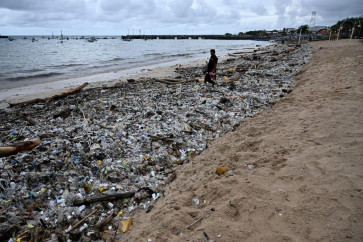Indo Komoditi Korpora to penetrate palm oil industry in 2017
Rubber trading company Indo Komoditi Korpora (INCF) plans to enter the palm oil industry in the wake of the government’s efforts to persuade neighboring countries to jointly reduce rubber production
Change text size
Gift Premium Articles
to Anyone

R
ubber trading company Indo Komoditi Korpora (INCF) plans to enter the palm oil industry in the wake of the government’s efforts to persuade neighboring countries to jointly reduce rubber production.
To fulfill the plan, the company — which was previously called Amstelco Indonesia — is seeking to acquire a palm oil company using funds from bank loans and a rights issue early next year.
“The total investment needed for the palm expansion might reach Rp 600 billion [US$46.06 million]. We hope to get at least Rp 400 billion in funds from the rights issue,” Indo Komoditi Korpora president director Sujaka Lays said after the relisting of his company at the Indonesian Stock Exchange (IDX) on Tuesday.
“Our target is to operate a palm plantation in Central Kalimantan next year.”
Considering its status as the world’s biggest palm oil producer, the Indonesian government has followed a roadmap for the development of Indonesia’s palm oil derivative and downstream industries since 2010, with the aim of improving the value of its palm oil in the export market.
According to data from the Indonesian Palm Oil Producers Association (Gapki), total exports of palm oil and palm kernel oil in the January to July period reached 14.4 million tons in exports, more than half of what it recorded throughout 2015 with 27.4 million tons.
The increasing export volume was the result of rising demand from China, India and Europe at various times last year, despite their slowing economies.
Meanwhile, Indo Komoditi Korpora currently runs a rubber business through its subsidiary Sampit International, which has an annual production capacity of 72,000 tons. It expects to add 40,000 tons to the figure next year.
Europe accounts for 40 percent of its total exports, followed by other destinations, such as the US and Australia.
“The price of rubber has reached the bottom line this year. So I’m optimistic that the price will be a lot better next year,” Sujaka said.
Indo Komoditi Korpora plans to allocate Rp 200 billion in capital expenditure (capex) next year for working capital and to improve its rubber production capacity.
It expects to book Rp 400 billion in revenue and Rp 12 billion in net profit by year-end, more or less the same as last year.
Meanwhile, Coordinating Economic Minister Darmin Nasution said in August that the government would persuade Thailand, Malaysia and Vietnam to reduce rubber production in order to stabilize rubber prices, which have plunged 70 percent over the past five years.
Grouped as the International Tripartite Rubber Council (ITRC), Indonesia, Thailand and Malaysia signed an agreement in February to cut exports by 615,000 tons in the six months before Aug. 31.
As a strategic partner, Vietnam also agreed to cut its exports by 85,000 tons. In total, the cut in exports amounts to 700,000 tons. However, as Vietnam failed to meet its commitment, the three ITRC members, which supply 67 percent of the world’s rubber, have agreed to take over Vietnam’s export quota and will implement the export restrictions until the end of this year.
Indonesian Rubber Producers Association (Gapkindo) estimates that Indonesia’s total exports will decline to 2.45 million tons this year from 2.6 million tons last year after the export cut. (vps)
----------------
To receive comprehensive and earlier access to The Jakarta Post print edition, please subscribe to our epaper through iOS' iTunes, Android's Google Play, Blackberry World or Microsoft's Windows Store. Subscription includes free daily editions of The Nation, The Star Malaysia, the Philippine Daily Inquirer and Asia News.
For print subscription, please contact our call center at (+6221) 5360014 or subscription@thejakartapost.com









